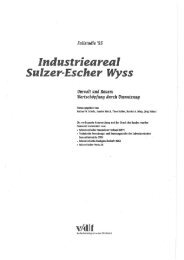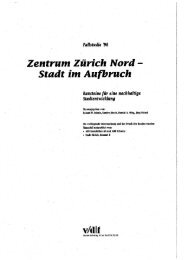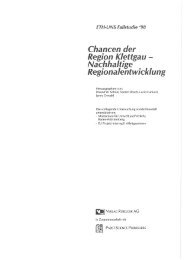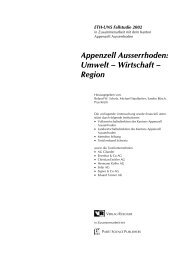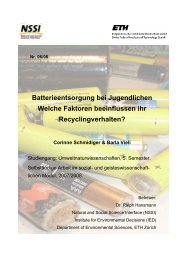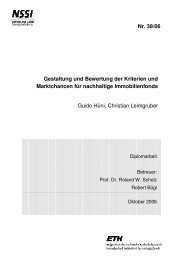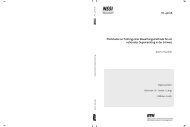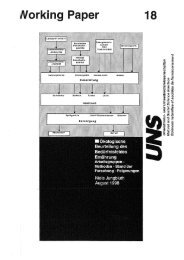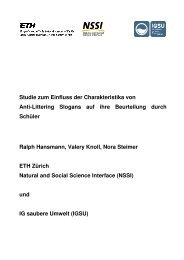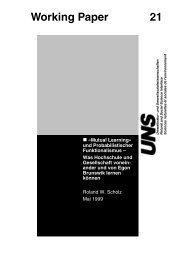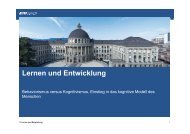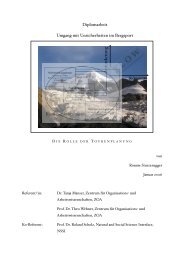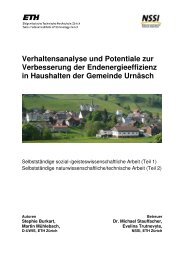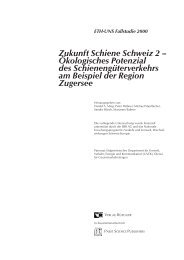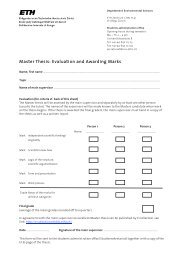European Workshop Wageningen
European Workshop Wageningen
European Workshop Wageningen
You also want an ePaper? Increase the reach of your titles
YUMPU automatically turns print PDFs into web optimized ePapers that Google loves.
Five years of experiences with the<br />
<strong>European</strong> <strong>Workshop</strong> Environmental<br />
Sciences and Management (EUW)<br />
Karen Fortuin, Environmental Systems Analysis Group<br />
8th Annual Meeting of the ITdNet, Vienna November 56, 2010
Outline<br />
Why a <strong>European</strong> <strong>Workshop</strong> (EUW)?<br />
What is the EUW?<br />
What are characteristics course components?<br />
Lessons learnt / Future challenges
Why a EUW?<br />
To prepare students to deal with complex problems<br />
To improve students’ boundary crossing skills<br />
Disciplinary boundaries<br />
Cultural boundaries<br />
Boundaries between theory and practice
What is the EUW?<br />
Students<br />
work on a complex (wicked) problem<br />
work together with 30 persons with different<br />
disciplinary and cultural background<br />
produce one concise report
What is the EUW?<br />
Students work<br />
in an intensive period of 8 weeks fulltime<br />
in the end of the first year of the MSc program<br />
apply knowledge, theory and skills and acquire new skills<br />
Three key chair groups at WU:<br />
Environmental Systems Analysis<br />
Environmental Policy<br />
Environmental Technology<br />
but an increasing interest from others
Timeline EUW<br />
Weeks<br />
Phases<br />
1<br />
1. Enrolment<br />
2 and 3<br />
4 and 5<br />
2. Preparation<br />
3. Field-work<br />
5 and 6<br />
4. Data analysis<br />
6 and 7<br />
5. Reporting<br />
8<br />
6. Reflection
Characteristics course components of the EUW<br />
Matrix approach<br />
Field work<br />
Role of the lecturers
Characteristic course components: EUW Matrix<br />
Expert 1<br />
(Policy<br />
Analysis)<br />
Expert 2<br />
(Stakehold.<br />
Analysis)<br />
Expert 3<br />
(Ecosyst.<br />
services<br />
Analysis)<br />
Expert 4<br />
Technol. &<br />
infrastructure<br />
Analysis<br />
Expert 5<br />
(Comm.<br />
strategy<br />
Analysis)<br />
MT<br />
Geo1<br />
P1.1+ CZ<br />
P1.2<br />
P1.3<br />
P1.4<br />
P1.5<br />
P1.1<br />
Geo2<br />
P2.1<br />
P2.2+ CZ<br />
P2.3<br />
P2.4<br />
P2.5<br />
P2.3<br />
Geo3<br />
P3.1<br />
P3.2<br />
P3.3 + CZ<br />
P3.4<br />
P3.5<br />
P3.2<br />
Geo4<br />
P4.1<br />
P4.2<br />
P4.3<br />
P4.4 + CZ<br />
P4.5<br />
P4.4<br />
Geo5<br />
P5.1<br />
P5.2<br />
P5.3<br />
P5.4<br />
P5.5 + CZ<br />
P5.5<br />
+ CZ
Characteristic course components: EUW Matrix<br />
Enables students to deepen their disciplinary<br />
knowledge and skills<br />
Forces them to cross disciplinary boundaries<br />
Enables intensive group interaction<br />
Facilitates involvement of every student<br />
Facilitates formulation of goal, research questions,<br />
and writing together
Field work: what do the students do?<br />
Meet the client<br />
Collect data by interviews, questionnaires and field<br />
observations<br />
Make a start with analyzing data<br />
Present preliminary results to the client and receive<br />
feedback<br />
‘Experience’ the study area
Characteristic course components: Field work<br />
Setting in which students have to deal with the<br />
complexity<br />
Context in which students have the possibility to<br />
integrate classroombased knowledge, to transcend<br />
disciplinary knowledge and to combine and connect<br />
findings<br />
Provides plenty of opportunities for communication<br />
(contentrelated, managerial & informal)
Course components: Role of the lecturers<br />
Limited supporting ‘disciplinary’ lectures<br />
Applied skills training in<br />
Project management<br />
Data collection methods<br />
Group dynamics<br />
Many plenary and subgroup feedback sessions to<br />
facilitate the research & learning
10 EUW’S in 4 different countries<br />
Topics:<br />
Cycling in the city<br />
Green in and around the city<br />
Sustainable development of brown fields<br />
Sustainable urban water management<br />
Reinvigoration of a coastal area<br />
Scenarios for sustainable water management<br />
Countries:<br />
Czech Republic, Ukraine, Norway and Uzbekistan
Needed to make the EUW a success<br />
Good ToR<br />
Written together with and supported by the commissioner<br />
Related to the ‘disciplines’ of the participating students<br />
Fitting the matrix approach (2 dimensions of the issue)<br />
Clear yet flexible structure<br />
three phases, supporting sessions, EUW matrix
Needed to make the EUW a success<br />
Good communication between all involved<br />
Skype, video conferencing<br />
SharePoint, flip chart in the field<br />
Trust<br />
Respect for everybody’s contribution<br />
Possibility to do independent research in the field<br />
Contact persons per area<br />
Means of transportation<br />
‘Freedom’ for the students
Needed to make the EUW a success<br />
Team of ‘lecturers’<br />
From different disciplines<br />
Methods & methodology<br />
Who get along, trust and somehow supplement each<br />
other & who can disagree<br />
Who are good facilitators<br />
who can be a bit modest<br />
who see the importance of learning by interaction
Cultural dimension?<br />
Student group<br />
Preferably no dominance of a nationality in group / MT<br />
Research area<br />
It was not always possible to do independent research<br />
It was not always expected that students can do a good<br />
job<br />
Not in all cases the importance of mutual learning was<br />
acknowledged
Future challenges<br />
EUW as a more Transdisciplinary case study?<br />
More and other involvement of the ‘commissioner’?<br />
How is transdisciplinarity influenced by cultural<br />
differences?<br />
How is transdisciplinarity influenced by language barriers?<br />
EUW in cooperation with local universities?<br />
using modern ITC and the Internet?
Thank you for your attention!
Communication is supported by SharePoint<br />
Special website to support the<br />
communication within and between:<br />
geogroups<br />
expert groups<br />
Czech / Ukraine / Norwegian student group<br />
management team<br />
students and teachers<br />
SharePoint EUWMarine 2010



